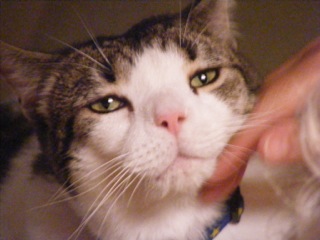
Sammy
 Case Background
Case Background
Name: Sammy
Age: 13 years
Sex: Male, neutered
Breed: DSH, cat
Age: 13 years
Sex: Male, neutered
Breed: DSH, cat
 Clinical History
Clinical History
Please review Sammy’s clinical history.
Sammy presented for dental prophylaxis. Examination 2 weeks previously when pre-operative blood work was obtained was unremarkable. But on the morning of his planned dental procedure an arrhythmia was ausculted. The owner reports that he seems free of clinical signs of heart disease at home.
 ECG
ECG
View Sammy’s electrocardiogram (the black bar represents one second)
What abnormalities are present on this ECG?
 Discussion & Treatment
Discussion & Treatment
Discussion: Atrial fibrillation is uncommonly recognized in cats and it is exceedingly rare in normal cats (e.g. they typically don’t develop primary atrial fibrillation). Despite the reported normal clinical status at home further diagnostics including an echocardiogram and likely a radiograph are required prior to the dental procedure. The presence of atrial fibrillation in a cat is worrisome for advanced myocardial disease and potentially even occult impending or early congestive heart failure. Treatment/management: Treatment will depend on the results of the imaging studies and ventricular response rate of the atrial fibrillation. A calcium channel blocker, such as diltiazem, is most commonly used to slow rapid atrial fibrillation in the cat. Another option to treatment to slow ventricular response rate would be a beta-blocker, such as atenolol, if the cat was not in active congestive heart failure. If the cat had concurrent ventricular arrhythmia, another treatment option would be sotalol or even in some cases refractory cases amiodarone. Sammy was ultimately diagnosed with severe restrictive cardiomyopathy and he developed congestive heart failure 2 months after the ECG was performed.